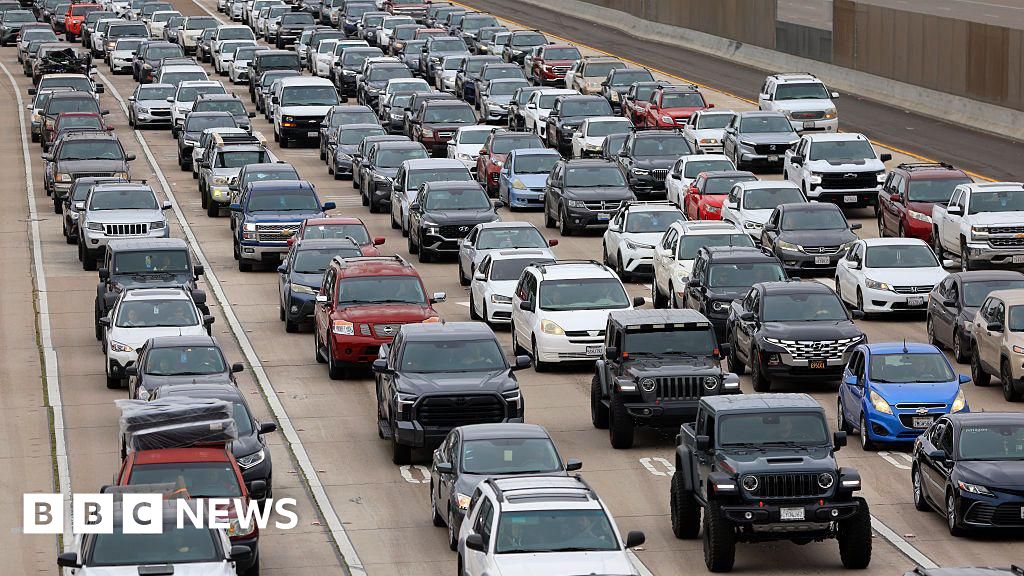- Media
Kochanowicz limita a Dodgers y Angelinos logran cinco dobles matanzas para imponerse por 6-2
时间:2010-12-5 17:23:32 作者:Podcasts 来源:Tech 查看: 评论:0内容摘要:The offer would come at a “last-minute” meeting planned for Tuesday night between South African officials and Musk or his representatives, Bloomberg said. South Africa’s President Cyril Ramaphosa and a delegation of government officials arrived in Washington on Monday in a bid to reset strained ties with the US.The offer would come at a “last-minute” meeting planned for Tuesday night between South African officials and Musk or his representatives, Bloomberg said. South Africa’s President Cyril Ramaphosa and a delegation of government officials arrived in Washington on Monday in a bid to reset strained ties with the US.
The administration has not made a final decision and it could wait to impose any plans after a federal appeals court on Thursday temporarily reinstated the most sweeping of Trump’s tariffs following a trade court ruling to immediately block them, the report added.The Wall Street Journal reported on Thursday evening that the White House is considering imposing tariffs of 15 percent for 150 days on US trade partners by invoking a little known provision of the 1974 Trade Act, citing people familiar with the matter.

The stop gap measure would buy the Trump administration time to draft individual tariff schemes for its trading partners using a separate provision of the same law targeting unfair trade practices, the report said.The process would be lengthy and complex, but would put the tariffs on a much stronger legal foundation. Discussions are reportedly still underway at the White House, according to the Journal.Wednesday’s surprise ruling

by the US Court of International Trade had threatened to halt or delay Trump’s “Liberation Day” tariffs on most US trading partners, as well as import levies on goods from Canada, Mexico and China related to his accusation that the three countries were facilitating the flow of fentanyl into the US.The International Court of Trade said tariffs issued under the International Emergency Economic Powers Act (IEEPA), which is typically used to address issues of national emergencies rather than addressing the national debt, were considered overreach.

Experts said the IEEPA, which was passed in 1977, is narrow in scope and targets specific countries, US-designated “terrorist organisations”, or gang activity pegged to specific instances. The US, for example, used the law to seize property belonging to the government of Iran during the hostage crisis in 1979 and the property of drug traffickers in Colombia in 1995.
“The 1977 International Emergency Economic Powers Act doesn’t say anything at all about tariffs,” Bruce Fain, a former US associate deputy attorney general under Ronald Reagan, told Al Jazeera.In the early hours of Tuesday morning, thousands of
people made the long journey to south Gaza, many walking tens of kilometres in the scorching summer heat to reach a newly established aid distribution centre run by the Israeli- and US-backed Gaza Humanitarian Foundation (GHF).Among them was Walaa Abu Sa’da (35), mother of three children who decided to go to Rafah by herself.
“My children were on the verge of starving. No milk, no food, not even baby formula. They cried day and night, and I had to beg neighbours for scraps,” Abu Sa’da toldWhile the previous United Nations-led distribution network operated about 400 sites across the Strip, the
- 最近更新
- 2025-07-07 10:28:17Serbia's protesting students rally nationwide, putting pressure on Vucic to call early elections
- 2025-07-07 10:28:17Serbia's protesting students rally nationwide, putting pressure on Vucic to call early elections
- 2025-07-07 10:28:17April 8 solar eclipse: What you need to know before you watch
- 2025-07-07 10:28:17Ser católico en una universidad secular puede ser un desafío; otros lo ven como una bendición
- 2025-07-07 10:28:17Former US Census Bureau director John Thompson, who guided preparations for 2020 head count, dies
- 2025-07-07 10:28:17Williams, Collier lead the way as the Lynx topple the Storm 82-77 in early West showdown
- 2025-07-07 10:28:17Death toll reaches at least 200 in Nigerian town submerged in floods
- 2025-07-07 10:28:17Orioles press box namesake Jim Henneman, a longtime official scorer and beat writer, dies at 89
- 热门排行
- 2025-07-07 10:28:17Kardea Brown’s Sweet Heat Baked Beans
- 2025-07-07 10:28:17Serbia's protesting students rally nationwide, putting pressure on Vucic to call early elections
- 2025-07-07 10:28:172025 EBRI/Greenwald Retirement Confidence Survey
- 2025-07-07 10:28:17Stan Love, brother of Beach Boys' Mike Love and father of Heat's Kevin Love, dies at 76
- 2025-07-07 10:28:17Israel kills 29 Palestinians as Hamas says ready for Gaza ceasefire talks
- 2025-07-07 10:28:17Ukraine says Russia launched its biggest drone attack yet
- 2025-07-07 10:28:17"choosing my own adventure."
- 2025-07-07 10:28:17Qatar Airways earns $2.15 billion profit in fiscal year
- 友情链接
- How political chaos helped forge South Korea's presidential frontrunner The poison paradox: How Australia's deadliest animals save lives Clock still keeping village on time after 500 years Three quarters of driving test centres at maximum wait time Amazon tribe sues New York Times over story it says led to porn addict claims Farage would crash economy like Truss, says Starmer National parking platform seeks to end 'hassle' of multiple parking apps Oasis fans' anger at Manchester gig ticket plan Writers plan to turn phone boxes into writing hubs US trade court blocks Trump's sweeping tariffs. What happens now? Life is improving in Nigeria, Tinubu says Town gets red carpet treatment for fashion show Busy hurricane season expected as forecasters fear Trump cuts Solar farm and energy store unanimously approved Wildfire warning sign placed in Peak District Candles, wreaths, famous faces: VE Day at 80 in pictures Haribo recalls bags of sweets in Netherlands after cannabis found Walkers asked to look for rare mountain butterfly Sean 'Diddy' Combs raped and attacked ex-assistant, she tells court Massive solar farm gets green light at High Court The tiny island where puffins are thriving despite global decline South Africa police target gang kidnapping women in shopping centres Artist's 'heartbreak' over AI generated images Wales 'confident' of hosting Euro 2028 opening ceremony Met Gala tickets cost $75,000. Here's what to know about fashion's biggest night India's colonial past revealed through 200 masterful paintings Fortnite faces complaint from actors' union over AI Darth Vader Is Britain really inching back towards the EU? Writers plan to turn phone boxes into writing hubs Wales 'confident' of hosting Euro 2028 opening ceremony
